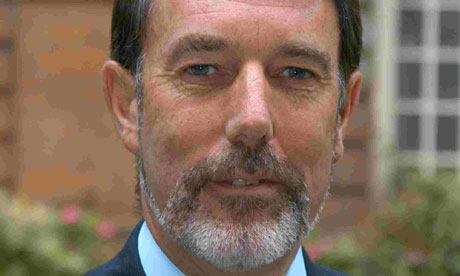
Hospitals will be forced to treat wealthy foreigners to raise cash rather than treat poor patients as they are hit by cuts to the NHS budget and the government's radical pro-market reforms, the leader of Britain's doctors has warned.
In an interview with the Guardian, Hamish Meldrum, chairman of the British Medical Association, predicted the government's health and social care bill would see the NHS being rebuilt on a "philosophy that relies on a market-based health system rather like the one we see in the United States.
"There, those who pay or are insured get a better service than those who do not and rely on state-funded Medicare. Until now our system has been built on social solidarity where patients get appropriate treatment in the appropriate time."
He said the government was forcing all hospitals to become foundation trusts and these would be gearing up to lure private patients from home and abroad as budgets were squeezed. This decision, he argued, would only be possible because the government plans to abolish the cap limiting the proportion of total income hospitals can earn from the paying sick.
With waiting times creeping up and the government encouraging private care, Meldrum said patients would be back to a system where those with cash can jump ahead of those in need.
"Trusts are being encouraged to concentrate on profitable areas of work rather than the most essential … like mental health, accident and emergency and care for the elderly. These are not profitable. But heart operations for wealthy Arabs will be."
The intervention comes at a crucial moment for the coalition's health bill. The BMA, which earlier this summer voted to launch a public campaign opposing the bill, has joined the Royal College of General Practitioners and the Royal College of Nursing – which between them represent more than 500,000 frontline clinical NHS staff – to fight the bill. Today all MPs will receive a letter from Meldrum calling for the bill to be withdrawn or subject to "significant amendment".
The letter reads: "We believe there continues to be an inappropriate and misguided reliance on 'market forces' to shape services. This is very clear in the general direction of policy travel, such as widening patient choice to 'Any Qualified Provider' (AQP) across a much larger range of services, which has the potential to destabilise local health economies."
Although earlier this summer the government halted the bill's progress and appointed a high-level team headed by Professor Steve Field, former chair of the Royal College of General Practitioners, to review its proposals, the changes recommended – amounting to 1,000 amendments – have not persuaded the BMA to drop its opposition to the bill.
The Commons is preparing to debate the changes to the bill amid suggestions that half a dozen Liberal Democrat MPs, under pressure from grassroots activists, may abstain and at least one, Andrew George, has signalled he will oppose the legislation. Meldrum said he was courting Lib Dems who were "intuitively more sympathetic to our message" than Conservative MPs.
This weekend Labour and the health unions will launch an "NHS Alert" campaign in 60 Conservative and Lib Dem seats across England, aimed at putting local pressure on MPs before next week's Commons votes.
Meldrum said David Cameron had been mistaken when in a speech in Cornwall last month the prime minister claimed that his plans to change the NHS beyond recognition had "the whole health profession on board".
"I don't know where the prime minister gets his information from to make that statement. I can only imagine he must be taking to a completely unrepresentative group of clinicians," said Meldrum.
The BMA says it "acknowledges the efforts of government to listen" but that the government's changes either do not alter the fundamental problems with the bill or they make it worse. Meldrum pointed out that a new NHS bureaucracy was springing up with five different bodies able to buy care for patients. He also argued that the choice and competition agenda of the health secretary, Andrew Lansley, remained intact.
The BMA chairman said he was especially concerned that surgeons' pay would be related to medical outcomes and that family doctors would be paid on how well they commissioned care for patients. This would penalise GPs and hospitals in poorer areas where residents' health was related to transport, housing and employment. "Doctors in well-off areas would benefit and those in poor areas would not."
He also argued that articulate middle-class patients would be able to take advantage of the patient choice policy. "Those who are articulate and shout loudest will tend to get better care. The less well-off patient will not. This will see an increase in health inequality."
John Healey, the shadow health secretary, said that despite the government's claims to have listened, Meldrum's comments showed that "the chorus of concern among health service professionals is as loud as ever".
Healey said: "With doctors and nurses now hardening their position, it is clear that David Cameron is in denial and out of touch when he claims his NHS plans have widespread support. After a wasted year, during which time we've seen patient services starting to go backwards, the prime minister should scrap both the bill and his massive reorganisation plans."
The Department of Health said: "The BMA's campaign is disappointing because as the doctors' union they previously said they were 'pleased that the government has accepted the Future Forum's core recommendations, and that there will be significant revisions to the bill'.
"We will never privatise the NHS and patients will never have to pay for NHS care. Our plans have been greatly strengthened in order to safeguard the future of the NHS."

